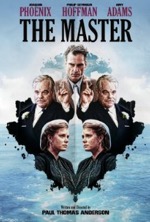The Master (R)
02/02/14 22:54 Filed in: 2012

Starring: Philip Seymour Hoffman
September 2012
The Master has all of the directorial deftness, acting acumen and narrative nuance one could hope for in an instant classic. It’s as if the word Oscar is subliminally inscribed onto each individual frame of the film. As the movie languidly rolls along, all you see is Oscar...Oscar...Oscar. Whether or not the film’s formidable array of talent and production values translates into actual statuettes remains to be seen, but a more obvious example of Oscar bait you’re not likely to find.
Paul Thomas Anderson’s direction is utterly mesmerizing, aided in subtle yet profound ways by Mihai Malaimare Jr.’s sumptuous cinematography. Philip Seymour Hoffman is typically terrific as a charismatic cult leader and Joaquin Phoenix is masterfully magnetic as an aimless, restless lush—he’s taken his performance as Johnny Cash in Walk the Line (2005) and slathered on new layers of physical ticks and mental neuroses. Amy Adams is effective in her role but there isn’t as much meat on the bone here as there was in her last outing with Hoffman in the dramatically taut Doubt (2008). Laura Dern has even less screen time than Adams, but makes the most of a pivotal supporting role as a passionate acolyte of Hoffman’s dianetics-esque religion.
Performances aside, the story is a rich, multi-layered yarn that has much to say about humanity’s search for significance in the ebbs and flows of life. Phoenix is the yin to Hoffman’s yang…in a strange twist of fate the two become unlikely friends. In unexpected yet undeniable ways, one is the answer to the other: Phoenix lacks structure and focus and Hoffman needs more insouciance and spontaneity.
The Master is a microcosm of our collective struggle to ascertain the reason for being. The film’s paradoxical layers of meaning are as insidious as they are insightful: just as spectators strive to apprehend the purpose of their own existence, the characters in the film also seek to understand their role and place in the cosmos. In a shrewd attempt at indoctrination, the film projects its prescriptions and hypotheses of sentience through its characters onto the viewer, who then must embrace or outright reject such precepts based on previously formed beliefs and world views. Though the film appears benign, it is extremely aggressive in its refusal to leave us unchanged where life’s big questions are concerned.
However, for all of its ostensibly insightful glimpses into the essence of existence, the story ends up being little more than a manifesto for the free thinking, existential, touchy-feely set. Despite it’s utterly engrossing narrative, brilliantly told and visualized by Anderson, The Master will undoubtedly leave its audience in a “huh?” haze as the end credits roll. It’s not that the plot is too hard to follow or its structure too complex, but when all is said and done what does it all mean?
In the same way that Clint Eastwood’s Hereafter (2010) posed many questions about the afterlife but ultimately proved inadequate at answering any of them (of course), The Master posits numerous notions concerning the nature of reality but fails to convince the audience of its doctrines. In the end, the film’s lasting relevance will be more for its artistry than its philosophy (sophistry?). Maybe the real answer to existence is striking the balance between Hoffman’s relentless pursuit of knowledge and Phoenix’s unbridled lust for life.
Rating: 3